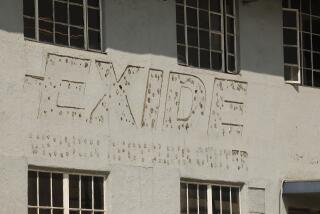Torrance Asks for Tougher Mobil Refinery Safety Plan : Industry: City wants firm to tighten rules for use of a chemical that is designed to reduce risk of accidents. The company says it is reviewing the request.
- Share via
Urged on by residents and businesses that are worried about safety, Torrance will seek tougher safeguards for use of a modified form of toxic hydrofluoric acid at the local Mobil Oil Corp. refinery.
On a 4-3 vote, the Torrance City Council late Tuesday requested stiffer guidelines for phasing in a new version of “HF” that Mobil reports is safer than the traditional form of the acid.
But no one seemed certain Wednesday whether the council vote will finally resolve the long-running dispute over refinery safety that has dominated Torrance politics for months. It is still unclear whether Mobil will acquiesce, or if the city’s request will force a court hearing.
The three council members who opposed seeking the guidelines labeled them too weak to guarantee safety at the 750-acre South Bay refinery flanked by homes and offices. One opponent, Councilman Dan Walker, called Mobil’s proposed technology untested and questioned if it would work--or if, in the end, the refinery would even implement it.
“We’ve got a company that, unfortunately, has a history of safety errors,” Walker said.
“We’ve got a company that, unfortunately, has a history of safety errors,” Walker said.
A Mobil spokesman said the company is reserving judgment until it can review the final version of the city’s request. Mobil regional manager Joel Maness said Tuesday night that although company officials needed to study the city proposal, “It’s good to see the issue moving forward.”
The vote marked the latest chapter in a 1990 legal pact forged between Torrance and Mobil after a string of refinery accidents and growing concern over hydrofluoric acid’s ability to form a toxic cloud. The refinery uses the acid to boost the octane of unleaded gasoline.
In the pact, Mobil agreed to stop using the chemical at its Torrance refinery by 1997 unless it could develop a safe form of the acid by the end of 1994.
Mobil officials announced this winter that a new additive and other techniques could reduce the risk by 80%. A court-supervised safety adviser, EQE International of Irvine, determined last month that Mobil should be allowed to implement the new technology, and the city had until today to object to the report.
If the city had not objected, it would have cleared the way for Mobil to switch to modified HF without further review, said Michael Leslie, an attorney for the city.
Instead, the council voted Tuesday night to declare that report insufficient, expressing concern that despite testing, Mobil’s modified technology has not been used before in a full-scale refinery unit. The council asked the safety adviser to adopt proposed guidelines giving the city and EQE increased oversight of Mobil’s conversion.
If Mobil does not agree to the guidelines, the city will ask for a hearing before Judge Harry V. Peetris, the retired judge overseeing the pact, Leslie said.
Mobil has been under fresh scrutiny in recent months after an October explosion that injured 28 workers. Air-quality officials have blamed a Mobil gasoline spill for fume problems that sickened some workers Feb. 3 at Toyota’s U.S. headquarters, east of the refinery, although Mobil officials said last week they were not sure the spill caused the fumes.
More to Read
Inside the business of entertainment
The Wide Shot brings you news, analysis and insights on everything from streaming wars to production — and what it all means for the future.
You may occasionally receive promotional content from the Los Angeles Times.










